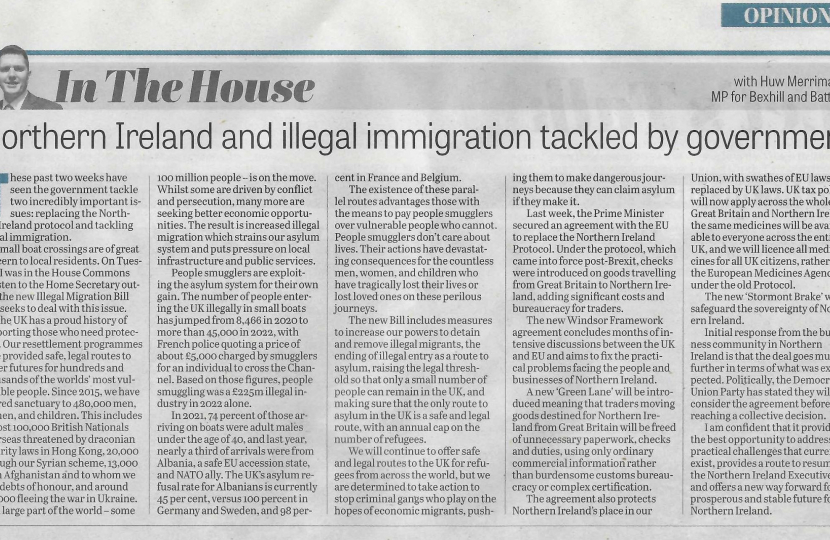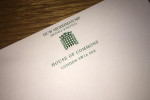
These past two weeks have seen the government tackle two incredibly important issues: replacing the Northern Ireland protocol and tackling illegal immigration.
Small boat crossings are of great concern to local residents. On Tuesday, I was in the House Commons to listen to the Home Secretary outline the new Illegal Migration Bill that seeks to deal with this issue.
The UK has a proud history of supporting those who need protection. Our resettlement programmes have provided safe, legal routes to better futures for hundreds and thousands of the worlds’ most vulnerable people. Since 2015, we have offered sanctuary to 480,000 men, women, and children. This includes almost 100,000 British Nationals Overseas threatened by draconian security laws in Hong Kong, 20,000 through our Syrian scheme, 13,000 from Afghanistan and to whom we owe debts of honour, and around 150,000 fleeing the war in Ukraine.
A large part of the world – some 100 million people – is on the move. Whilst some are driven by conflict and persecution, many more are seeking better economic opportunities. The result is increased illegal migration which strains our asylum system and puts pressure on local infrastructure and public services.
People smugglers are exploiting the asylum system for their own gain. The number of people entering the UK illegally in small boats has jumped from 8,466 in 2020 to more than 45,000 in 2022, with French police quoting a price of about £5,000 charged by smugglers for an individual to cross the Channel. Based on those figures, people smuggling was a £225m illegal industry in 2022 alone.
In 2021, 74 percent of those arriving on boats were adult males under the age of 40, and last year, nearly a third of arrivals were from Albania, a safe EU accession state, and NATO ally. The UK’s asylum refusal rate for Albanians is currently 45 per cent, versus 100 percent in Germany and Sweden, and 98 percent in France and Belgium.
The existence of these parallel routes advantages those with the means to pay people smugglers over vulnerable people who cannot. People smugglers don’t care about lives. Their actions have devastating consequences for the countless men, women, and children who have tragically lost their lives or lost loved ones on these perilous journeys.
The new Bill includes measures to increase our powers to detain and remove illegal migrants, the ending of illegal entry as a route to asylum, raising the legal threshold so that only a small number of people can remain in the UK, and making sure that the only route to asylum in the UK is a safe and legal route, with an annual cap on the number of refugees.
We will continue to offer safe and legal routes to the UK for refugees from across the world, but we are determined to take action to stop criminal gangs who play on the hopes of economic migrants, pushing them to make dangerous journeys because they can claim asylum if they make it.
Last week, the Prime Minister secured an agreement with the EU to replace the Northern Ireland Protocol. Under the protocol, which came into force post-Brexit, checks were introduced on goods travelling from Great Britain to Northern Ireland, adding significant costs and bureaucracy for traders. The new Windsor Framework agreement concludes months of intensive discussions between the UK and EU and aims to fix the practical problems facing the people and businesses of Northern Ireland.
A new ‘Green Lane’ will be introduced meaning that traders moving goods destined for Northern Ireland from Great Britain will be freed of unnecessary paperwork, checks and duties, using only ordinary commercial information rather than burdensome customs bureaucracy or complex certification.
The agreement also protects Northern Ireland’s place in our Union, with swathes of EU laws replaced by UK laws. UK tax policy will now apply across the whole of Great Britain and Northern Ireland, the same medicines will be available to everyone across the entire UK, and we will licence all medicines for all UK citizens, rather than the European Medicines Agency under the old Protocol. The new ‘Stormont Brake’ will safeguard the sovereignty of Northern Ireland.
Initial response from the business community in Northern Ireland is that the deal goes much further in terms of what was expected. Politically, the Democratic Union Party has stated they will consider the agreement before reaching a collective decision. I am confident that it provides the best opportunity to address the practical challenges that currently exist, provides a route to resuming the Northern Ireland Executive, and offers a new way forward for a prosperous and stable future for Northern Ireland.



